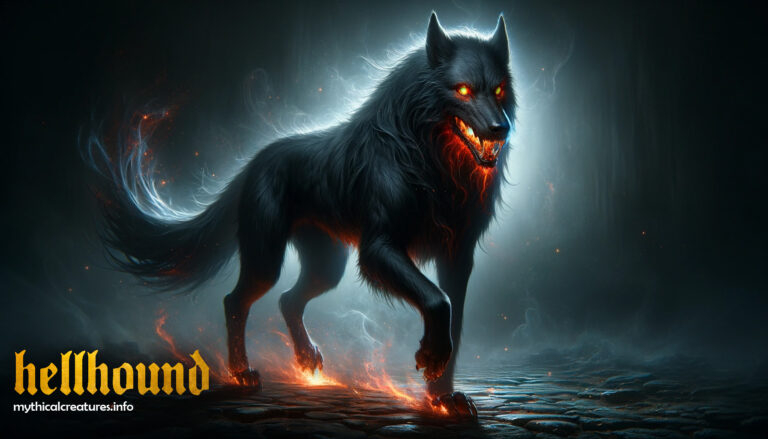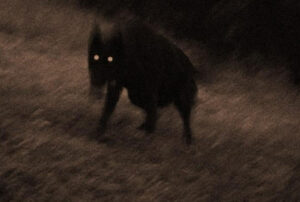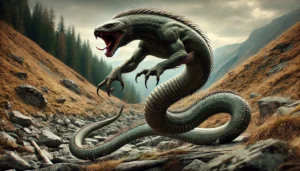Table of Contents
Hellhound are mythical or supernatural creature, often depicted as large, menacing, and demonic dog with fiery eyes and sometimes even flames or smoke coming from its mouths. Moreover, in many traditions, people associate hellhounds with the afterlife, believing that they guard the entrance to the underworld or other realms of the dead. These creatures are often considered supernatural guardians or servants of deities, demons, or even the devil himself. Consequently, they have the duty of hunting down and tormenting the souls of the damned.
The Appearance
Typically, hellhound are portrayed as gigantic, black dog with glowing red or yellow eyes. They often possess features that exude an aura of the supernatural, such as smoke-emitting nostrils or an ethereal form. Notably, their appearance varies across cultures – while Western depictions emphasize a more demonic aspect, Eastern interpretations might present them as more spectral or ghostly.
The Personality Characteristics
Contrary to popular belief, hellhounds aren’t merely symbols of doom. They exhibit a complex array of traits – while undeniably ferocious and intimidating, they also show remarkable loyalty, often depicted as guardians of the underworld or sacred sites. These creatures are intelligent, capable of understanding complex commands and tasks. Interestingly, their aggression is often selective, aimed at those who trespass into forbidden territories or break sacred laws.
Abilities
The abilities and characteristics of hellhounds can vary depending on the specific folklore, mythology, or fictional portrayal. However, some common abilities and traits that are often associated with hellhounds include:
Hellfire or Fire: Hellhounds often have a connection to fire or hellfire. They can breathe fire, possess flaming eyes, or be covered in flames, enhancing their menacing appearance.
Supernatural Speed and Strength: Hellhounds typically exhibit exceptional speed and strength. They relentlessly pursue their prey with unwavering determination.
Immortality or Regeneration: In some legends, hellhounds are immortal or possess the ability to regenerate, making them nearly invulnerable. This can make them even more formidable adversaries.
Invisibility or Shape-Shifting: Some depictions of hellhounds suggest that they have the ability to become invisible or take on different forms, making them difficult to detect or evade.
Many people often portray hellhounds as having otherworldly senses, including the ability to see in complete darkness and detect the scent of their prey from great distances.
Guardians of the Underworld: In many traditions, hellhounds serve as guardians of the entrance to the underworld or other realms of the dead. They may prevent the living from entering or the dead from escaping.
Malevolent Nature: People typically perceive hellhounds as malevolent and perilous beings, connecting them with death, doom, and destruction, and considering them as bearers of misfortune.
Mythical Origins and Cultural Significance
The hellhound’s origins can be traced back to ancient civilizations. In Greek mythology, Cerberus guards the entrance to Hades. Similarly, Norse legends speak of Garmr, a blood-stained guardian of Helheim. In Celtic stories, mention is made of the Cŵn Annwn, hounds of the otherworld. These creatures often symbolize death, protection of sacred sites, or serve as omens of war and destruction.
Cultural Representation of Hellhound
Greek Mythology
In Greek mythology, the most famous hellhound is Cerberus, the monstrous three-headed dog guarding the entrance to Hades, the underworld. Notably, this formidable creature prevented the dead from leaving and the living from entering without permission. Furthermore, Cerberus played a significant role in several myths, most notably in the story of Heracles’ Twelve Labors, where Heracles was tasked with capturing Cerberus as his final labor.
Eastern Folklore
In Eastern folklore, particularly in Japanese mythology, creatures similar to hellhounds appear, like the ‘Tengu’, often depicted as bird-like demons with canine traits. These beings are not purely evil; instead, they are seen as protective spirits of forests and mountains, although they can be wrathful if disrespected.
English Folklore
People often perceive hellhounds ominously in English folklore. The legend of Black Shuck, a ghostly black dog, provides a prominent example of this perception. Folklore states that Black Shuck roams the coastlines and countryside of East Anglia, and people regard encountering this creature as an omen of death. Northern England also has its own spectral hound, the Barghest, which is likewise associated with death and misfortune.
Scandinavian Folklore
Scandinavian folklore features the hellhound Garmr, a blood-stained guardian of Helheim, the realm of the dead. In the Norse myths, Garmr is often associated with Ragnarök, the end of the world, where he battles against the gods. He represents the destructive forces of chaos and the inevitability of death.
Native American Folklore
In Native American folklore, while not exactly hellhound, there are stories of spirit dogsor canine-like creature that guard the underworld or spiritual realms. For instance, the Choctaw tribe speaks of shadowy, dog-like creatures that guard the path to the afterlife, ensuring only the spirits of the deceased pass through.
Hellhound in Modern Culture
Today, hellhounds continue to be a popular subject in various forms of media. They appear in fantasy novels, horror movies, and video games, sometimes as malevolent beasts, other times as misunderstood creatures. Their portrayal has evolved, reflecting contemporary societal values and fears, transforming from purely malevolent entities to complex characters that can be both menacing and protective.
Movies:
Harry Potter Series: The Harry Potter series features a magical creature known as “Thestrals” that resemble skeletal, winged horses. Individuals who have witnessed death can see these creatures, and they often associate them with a grim or ominous presence, akin to hellhounds.
The Omen (1976): This classic horror film features a demonic dog that serves as a harbinger of doom for the main character.
Constantine (2005): In this film adaptation of the Hellblazer comic series, the titular character, John Constantine, encounters hellhounds as supernatural creatures sent to collect the souls of the damned.
Literature:
Dresden Files Series by Jim Butcher. This urban fantasy book series features hellhound as formidable supernatural creature that appear in several books.
Percy Jackson & the Olympians Series by Rick Riordan. Hellhounds are featured as monstrous creatures in this popular series of young adult fantasy novels.
TV Series:
Supernatural: The TV series “Supernatural” includes several episodes that feature hellhounds as terrifying supernatural entities. These episodes often depict them as relentless trackers and harbingers of death.
Teen Wolf: The Teen Wolf TV series features hellhounds, depicting them as supernatural creatures with a connection to death and the supernatural.
Video Games:
Devil May Cry Series: The video game series “Devil May Cry” includes various demonic creatures, including hellhounds, as adversaries for the protagonist, Dante.




